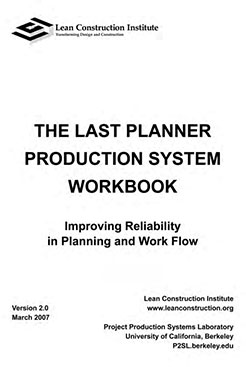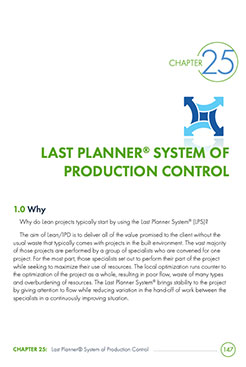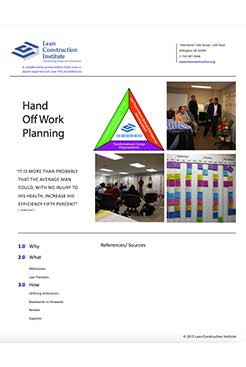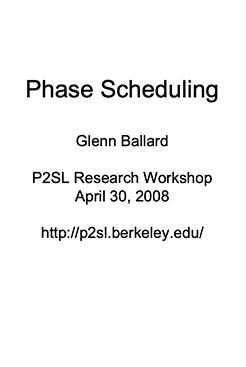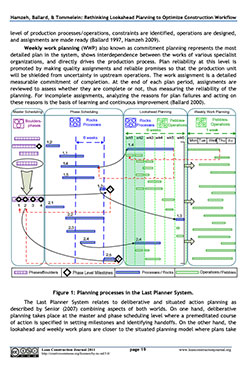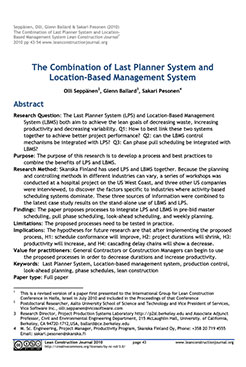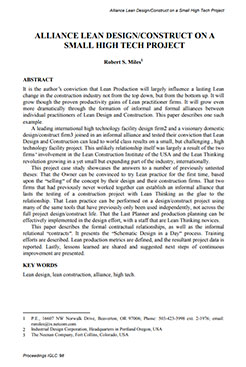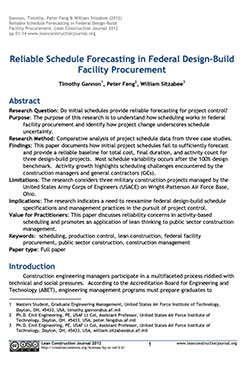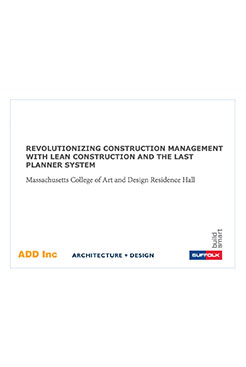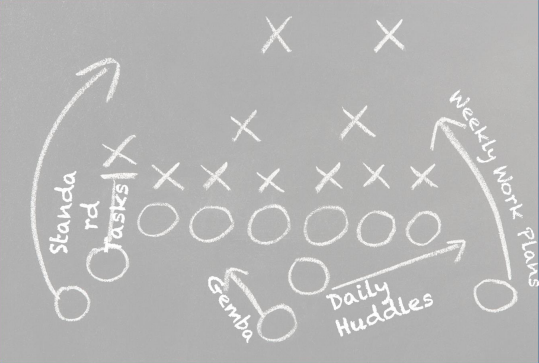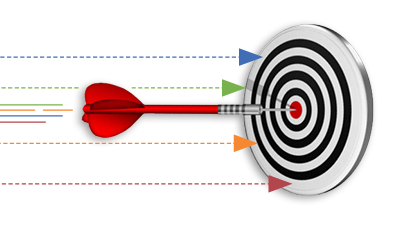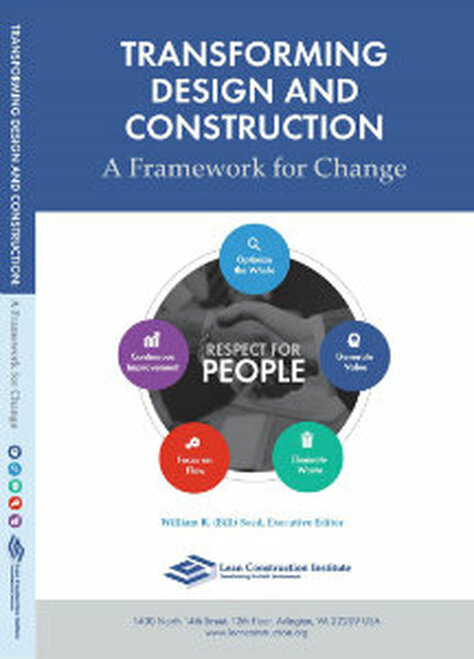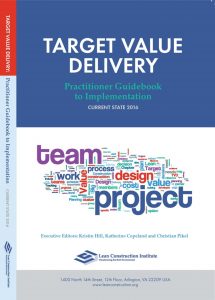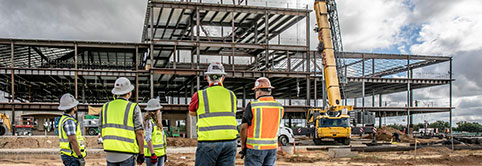The Last Planner System® (LPS®)
Introduction to the Last Planner System®
In traditional design and construction projects, the level of follow-through on commitments made is unfortunately low. On average, only 54% of work planned for a given week is completed within the allotted schedule. As a result, the vast majority of projects are delivered late and over-budget, stakeholders end up not being satisfied with the end result, and workers suffer injuries on the job.
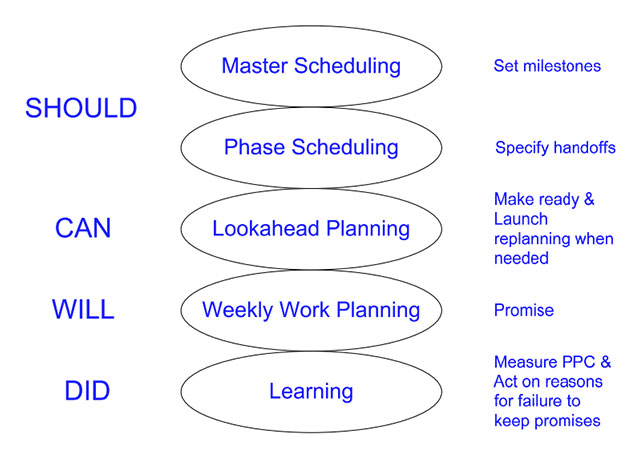
What is the Last Planner System?
The Last Planner System is a system for project production that promotes the creation of a predictable workflow among various parties so that it achieves reliable results. The LPS® allows potential hurdles to be found and addressed before they slow down the flow.
LCI’s Tenets
The primary goal of Lean in design and construction is to deliver maximum value to the customer or stakeholder without all of the waste that traditionally comes with projects. The Lean Construction Institute has identified six core tenets that any Lean enterprise should abide by. Those tenets are:
Enhancing Process and Flow
Let’s examine how the Last Planner System helps teams focus on process and flow – although LPS really helps teams align with all six tenets.
The Last Planner System focuses on generating and maintaining flow in work processes by promoting conversations between construction team members so they can identify problems before those issues interrupt the flow of work. This is done through pull planning.
What is Pull-Planning?
Pull planning is a method in which personnel, materials, information, equipment, and the like only arrive at the time and place in which they are needed to maintain the flow of the production process.
Daily Huddles and Weekly Work Planning
Flow can also be enhanced through daily huddles, construction planning meetings that allow team members to regularly meet and set expectations for each day’s work. Daily huddles also help teams complete a higher percentage of the task list outlined in the Weekly Work Plan.
Who is the Last Planner?
The last planner is the person closest to the work with authority to make decisions regarding the schedule and to make reliable commitments to complete the work of their discipline.
Benefits to Using the Last Planner System
The Last Planner System greatly enhances the flow of a project through collaborative planning, which allows workers on the job to plan their work together, rather than by a few in a vacuum and address issues together before they become so onerous that they inhibit the natural flow of work.
In reality though, LPS enhances all of the six tenets: respect is increased when team members collaborate to solve problems, waste is removed when work is done correctly the first time, flow is enhanced through careful planning, value increases as more time and resources are allocated towards value-adding procedures, continuous improvement occurs when the team learns from each breakdown in a cycle of planning, and the whole is optimized with better outcomes.
Additionally, innovation increases when lookahead planning allows team members to contribute unique countermeasures in real time.
Levels of the Last Planner System (5 Conversations)
The Last Planner System focuses on five conversations around which all planning occurs: should, can, will, did, learn.
- Pull-planning establishes what should be done.
- Make-ready planning gets the upcoming work in a condition so that it can be done.
- Weekly work planning establishes the set of promises from specific people for the work that will be done.
- Daily commitment management supports the last planners in staying on track with their promises so that the work did get done.
- At least weekly, the last planners take time to learn from their performance.
8 Key Elements of the Last Planner System
There are eight key elements of the Last Planner System which align with the five types of conversations teams have.
1. Milestone Planning
Conduct milestone planning by setting incremental goals that fit within the Master Schedule. (Should)
2. Pull Planning
Specify and plan handoffs within the project structure to determine what steps will “trigger” the next steps in the flow. Well-executed pull planning allows for easier structuring of Weekly Work Plans. (Should)
3. Make-Ready Planning
Ensure the work that is planned will be able to happen by removing constraints ahead of time. (Can)
4. Weekly Work Planning
Make weekly promises and generate specific plans to ensure that the work will get done as promised. This requires complete collaboration between team members to plan. (Will)
5. Constraint Management
Execute roadblock removal by identifying potential disruptions in the flow of the various project phases. (Will)
6. Daily Huddles
Break down the work week into smaller chunks through daily huddles, a management tool that allows team members to stay on track and renew their commitment to the Weekly Work Plan. (Did)
7. Percent Plan Complete
Determine how many of the team’s weekly tasks were completed on time. (Did)
8. Reasons for Variance
Use the data from the project’s completion to identify areas for improvement for the next project (or the next phase of the project). (Learn)
Principles of the Last Planner System
As outlined above, the Last Planner System allows design and construction management teams to plan in a more granular fashion as the team gets closer to the execution of the plan. The goal of LPS is not only to complete more of the weekly schedule’s task list, but to ensure that each week’s work is providing value to the end product.
Try the Last Planner System to discover how your team can enhance the flow of your work and produce plans collaboratively with those who are actually doing the work.
Quick Tip: Three Week Look Ahead Planning
Project Superintendent, Tony Lowe, utilizes a magnetic look ahead planning board to help his crews see the project as a whole. Explore the entire Last Planner System playlist.
Learn The Last Planner System
The Lean Construction Institute is committed to transforming the design and construction industry by providing Lean educational resources, conducting field research, and facilitating local and national Lean events. Explore the supplementary resources below to further your understanding of The Last Planner System.
Lean Assessments
How strong is your Lean knowledge? Take a Lean assessment to determine your current state so you have a baseline for improvement. Lean assessments are available for individuals, teams, and organizations alike. Whether you’re new to Lean or are an experienced Lean practitioner, Lean assessments are a great way to get started at LCI!
TAKE ASSESSMENTMore Lean Topics
From 5s to IPD, explore popular Lean design and construction topics below.

